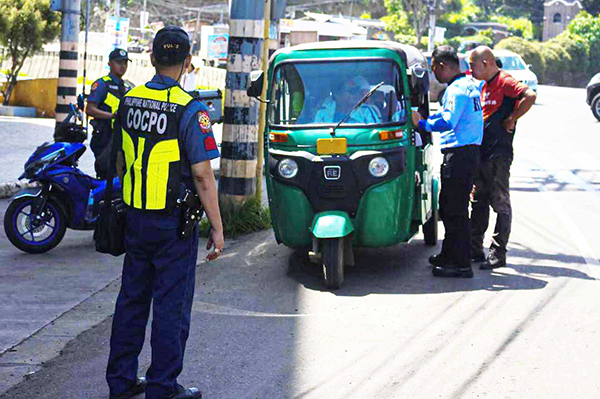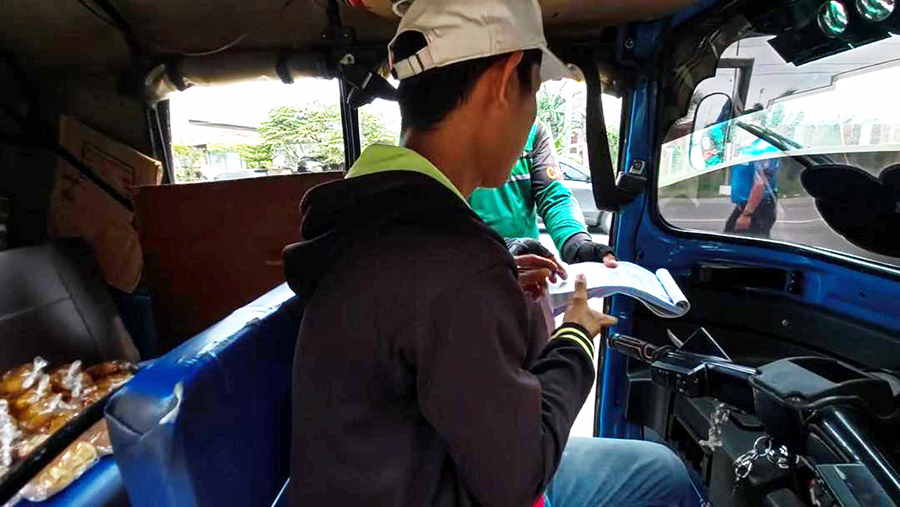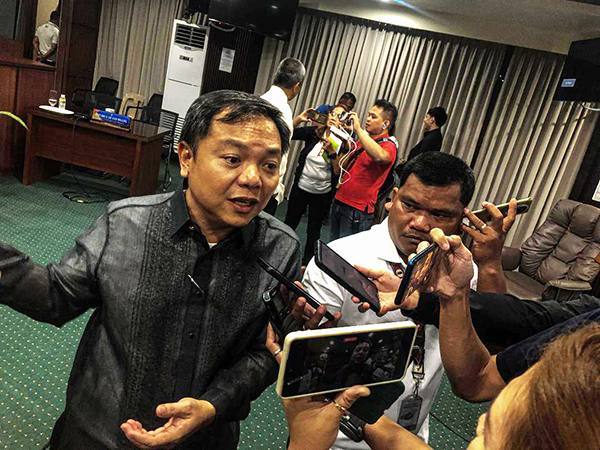Operators thank Cagayan de Oro dad for 'bao-bao' ordinance
CAGAYAN DE ORO CITY – A group of tricab or “bao-bao” operators thanked Councilor James Judith II for proposing an ordinance amending sections of the Traffic Code of Cagayan de Oro to legalize their operations.

AUTHORITIES flag down a bao-bao on the national highway in Cagayan de Oro City. (City Information Office)
Armando Villaflor, president of the Bugo-Puerto-Agusan-Tablon-Cugman Tricab Operators and Drivers Association (BPATC-TODA), said allowing them to take passengers on secondary roads will be a huge help as long as they are legal and not hiding from law enforcers.
“At least we are given a chance. We are very happy, even if it is on secondary roads,” Villaflor said on Tuesday, January 9.
Judith presented a special report during the city council session on Monday, January 8, about the ordinance he filed last week that seeks to allow bao-bao vehicles to travel on primary national highways for “private use” and become public transportation on secondary roads.
The ordinance seeks to amend Sections 4 (Definition of Terms), 109 (Conditions of Operations), 112 (PUV Drivers Obligations, Duties, and Responsibilities), 113 (Prohibited Acts), 114 (Printing of Plate Numbers), 147 (Place or Operations), 148 (Permit), and Section 150 (Regulations) of Ordinance No. 10551-2007 or the Traffic Code of Cagayan de Oro City.
Judith was prompted to file the ordinance after seeing a viral video posted by the iFM Cagayan de Oro on July 28, 2023, where a male bao-bao driver transporting bread was apprehended by an enforcer of the Roads and Traffic Administration (RTA) for traveling on the national highway in Barangay Tablon.

A BAO-BAO driver signs a traffic citation ticket issued by an enforcer of the Roads and Traffic Administration after he was apprehended on the national highway in Barangay Tablon on July 28, 2023. (Screengrab from video posted by Menzie Montes of iFM Cagayan de Oro)
The driver asked for consideration but he decided to take the traffic citation ticket instead which has a P500 penalty just to pass. The driver called on the city government to consider their situation as they did not travel on the national highway as public transportation.
Judith said he gathered facts prior to filing the ordinance and established a legal research team with his own money.
He was told by the team that bao-baos are allowed on national highways according to Land Transportation Office (LTO) Memorandum Circular 2020-2227 for Non-Conventional Vehicles under two conditions – there should be an ordinance approved by the city council and the bao-bao vehicle is for private use.
“Even the motorcycle that has two wheels, if safety is an issue, we allow them to travel on the national highway. How about the bao-bao that has three wheels?” Judith said in his special report.
Councilor Romeo Calizo, chairman of the committee on public utilities, contradicted the statement of Judith and said that bao-bao vehicles are prohibited on national highways and as public transportation based on the statements of line agencies during a series of meetings.
But Calizo supported the suggestions of Judith, saying that bao-bao vehicles would be a huge help in addressing the lack of public utility vehicles (PUVs).

COUNCILOR James Judith II answers questions from the media after the regular session of the 20th City Council of Cagayan de Oro on Monday, January 8. (Franck Dick Rosete)
The public utilities committee chair said only 55 out of 78 routes in the Local Public Transport Route Plan (LPTRP) are operating so far. Of the 55, he said there is no single route that has a complete array of PUVs that will address the needs of the commuting public.
For concerns that allowing bao-bao on national highways might be abused by those who wanted to take passengers, Judith said bao-bao vehicles that will be used for public transportation will be regulated – the same regulations as the “motorela” or motorized tricycle here – under the proposed ordinance.
To easily identify them, the name of the bao-bao operator and other required details must be visible on the vehicle, just like the motorela vehicles, the legislator said.
The BPATC-TODA president called on city lawmakers to give them a chance by approving the ordinance as they are willing to follow the same regulations as the motorela vehicles under the city’s Traffic Code.
Once the measure is passed, Villaflor said they will ask the appropriate government office if they can take the route from Cogon to Galaxy Road and Galaxy Road to Agora Integrated Bus Terminal to westbound Bulua Terminal passing Coastal Road as there are no motorela vehicles on these routes.
The proposed ordinance was referred to the committee on public utilities for further discussion.